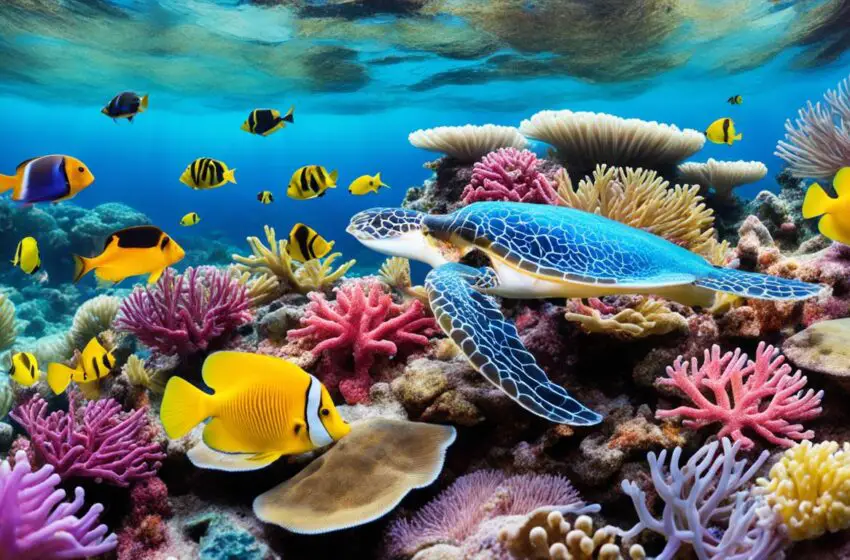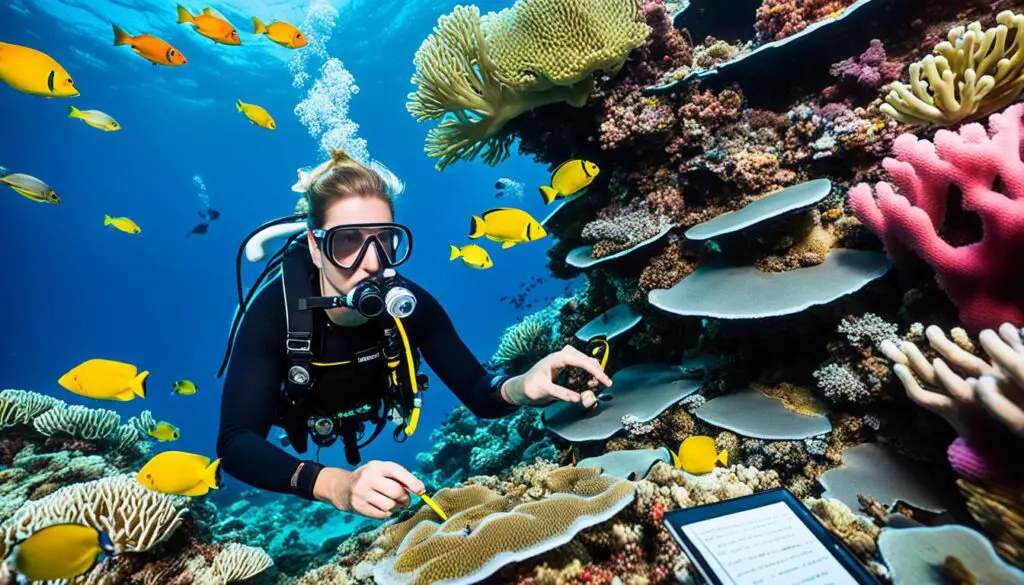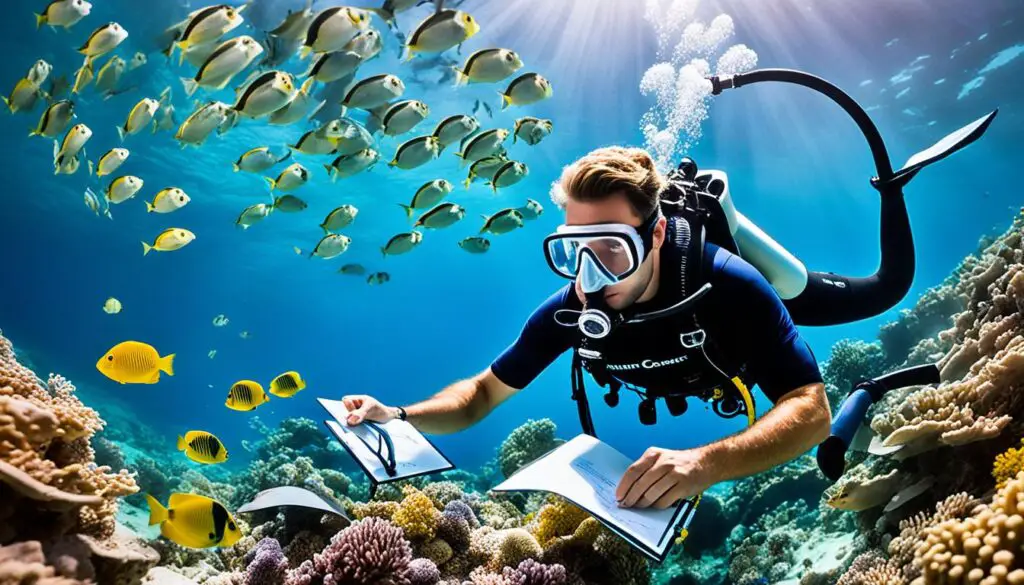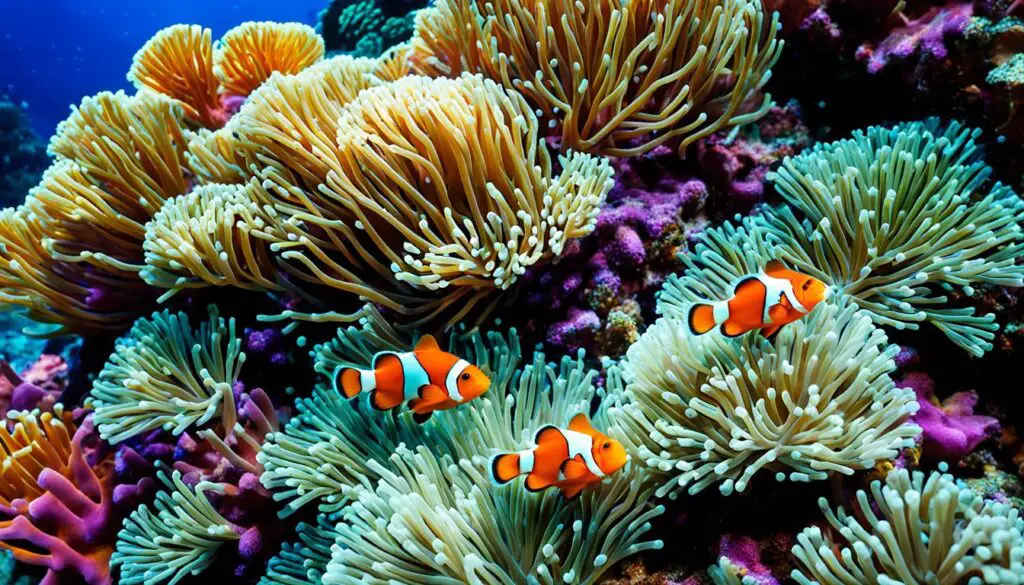Dive into Marine Pet Paradise: Expert Care Strategies

Welcome to the amazing world of marine pets! Have you ever been drawn in by the stunning beauty of the ocean? If so, you’re in luck. The National Marine Sanctuaries Webinar Series is here for you. This covers everything you need to know for keeping your marine pets healthy and happy.
This webinar series is a gold mine of educational and scientific knowledge. It’s all about boosting your ocean and climate smarts. With top experts leading the way, you’ll learn about marine life, dealing with trash in the sea, plant disease, and even finding ancient sites underwater. Each webinar gives you fresh ideas and studies to take better care of your marine friends.
At the National Marine Sanctuaries, we’re passionate about teaching to help save marine life. Our webinar series is wide open for everyone. It doesn’t matter if you’re an educator looking to learn more or just really love the ocean.
Ready to learn more and become a better marine pet owner? Join our webinar series. Together, let’s work on protecting our precious marine world.
Key Takeaways:
- Join the National Marine Sanctuaries Webinar Series for expert care strategies for your marine pet.
- Webinars cover a variety of topics, including marine mammals, marine debris, and underwater archaeology.
- Learn from renowned experts in the field and enhance your understanding of marine conservation.
- Open to formal and informal educators, as well as the interested public.
- Gain valuable insights to ensure the well-being and longevity of your marine pet.
The Importance of Marine Biologists in Conservation Efforts
Marine biologists are key in saving our oceans and the life within. These experts look at sea organisms and how they interact with their world. This gives us important information about the balance in the ocean.
They can focus on different topics like animal behavior, how organisms relate to each other, the sea itself, and genetics. Their knowledge helps us see the deep connections between sea life and their living spaces. This helps us learn what keeps them healthy and alive.
They are also big in making sure we fish responsibly. By checking on fish and their homes, they guide us on how to fish in ways that don’t harm the sea. This keeps our fish supply steady and safe without damaging their home.
“As marine biologists, we strive to protect the biodiversity of our oceans, not only for the benefit of marine life but also for the well-being of humanity. Every species plays a vital role in maintaining the balance of our planet.”
Marine biologists keep an eye on marine pollution too. They figure out how much harm pollution does to sea life. With their findings, they suggest ways to cut down on pollution and its bad effects. They work hard to find the sources of pollution and how to stop them.
They not only do research but they also teach people about the ocean. They want others to care for the sea as much as they do. By sharing their knowledge, marine biologists help us all feel responsible for keeping our waters safe.
Marine biologists have many job options, from teaching to working for organizations. No matter the job, they all help save sea life and keep the sea healthy. They’re vital for protecting our oceans and using its resources wisely.

Exploring Career Paths in Marine Biology
Marine biologists can choose from many career options. They can study various aspects like tropical marine biology, marine plants, or conservation. There are plenty of ways to make a difference in the marine world.
Choosing a career in marine biology means you have lots of choices. You can work at schools, research places, or even your own business. Marine biologists fit their work to what they love and believe in.
The work of marine biologists is very important. They help manage fish in a way that keeps the ocean healthy. They also help make rules that protect the sea and its creatures.
Marine biologists are also key in fighting marine pollution. They work to lower pollution levels and keep our oceans clean. Their work is crucial in saving marine life.
Education is another big part of their work. They teach and share why it’s vital to protect the seas. This helps more people understand how to keep the oceans safe for the future.
In marine biology, you can turn your love for the sea into a meaningful job. You might work in nature, in an office, a lab, or underwater. No matter the place, marine biologists work hard to protect our oceans.
Marine Biology Career Options
| Career Option | Description |
|---|---|
| Academia | Teaching and conducting research at universities and colleges. |
| Research Institutions | Working in specialized research centers and laboratories. |
| Non-profit Organizations | Joining conservation groups and organizations focused on marine issues. |
| Environmental Consultancies | Providing expertise and guidance on environmental impact assessments and sustainable practices. |
| Government Agencies | Working in regulatory bodies and agencies responsible for marine conservation policies. |
| Start-ups | Starting your own business or venture related to marine biology and conservation. |
There are many opportunities in the field of marine biology. This field allows you to work on conserving the sea and its life. It’s a step towards safeguarding our oceans.

Conclusion
Maintaining a marine pet needs careful work. It’s crucial for us to know what they need to be happy and live long. This means getting their home, food, and care right. This way, they can do well where they live.
Marine biologists are very important. They work hard to understand and protect our sea life. All their learning and work help us take better care of the ocean and its creatures. This is for us and the people after us.
If you dream of working to help the ocean, a career in marine biology is great. You could do research, help make rules, or teach about the sea. Marine biologists make a big difference by working to keep our oceans healthy. They help with fish, fighting pollution, and teaching others to care for the ocean.
Choosing a job in marine biology means you get to do what you love and help the world. There are many different ways you can work with ocean life. It’s not just a job, but a way to help make our environment better. Plus, you get to learn more about the cool creatures that live in the sea.
FAQ
What kind of topics are covered in the National Marine Sanctuaries Webinar Series?
The series covers many topics. These include marine mammals and debris. It also covers seagrass wasting disease and underwater archaeology.
Who is eligible to participate in the National Marine Sanctuaries Webinar Series?
Both formal and informal educators, along with anyone interested, can join.
What can I expect from the National Marine Sanctuaries Webinar Series?
You’ll hear from experts in marine science. They share their research and insights on marine issues. This helps everyone understand marine conservation better.
What do marine biologists study?
They look at marine life and how it interacts with the environment. Their studies cover many areas like marine ecology and genetics.
What role do marine biologists play in conservation?
They help manage fisheries sustainably. They also monitor pollution and educate people. Making conservation policies is another key area.
What career options are available in marine biology?
Marine biologists can specialize in different areas. They might focus on tropical areas or work in marine conservation.
Where can marine biologists work?
They can work in various sectors. This includes academia, charities, and government, depending on their interests.
What are the potential career opportunities in marine biology?
You could work in academia or with non-profits. Other options include government agencies and start-ups. Jobs can involve fisheries management or marine policy.
What environments do marine biologists work in?
They might work in the field, an office, a lab, or under the water. There are many different settings for their work.
How can I ensure the well-being and longevity of my marine pet?
Expert care strategies are key for marine pets. Consulting with a marine biologist is a smart move. This ensures your pet stays healthy and happy for a long time.
What impact do marine biologists have on marine conservation efforts?
They are critical for conserving marine life. Their work leads to better fisheries and less pollution. They also help educate people about the sea.
How can a career in marine biology contribute to conservation efforts?
Choosing this career path means making positive contributions. This includes working on sustainable fisheries and controlling pollution. Marine education is also a big part.
What opportunities does a career in marine biology offer?
There are many paths in marine biology. You could work to protect marine life and their environments. This is a chance to make a difference in conservation.

